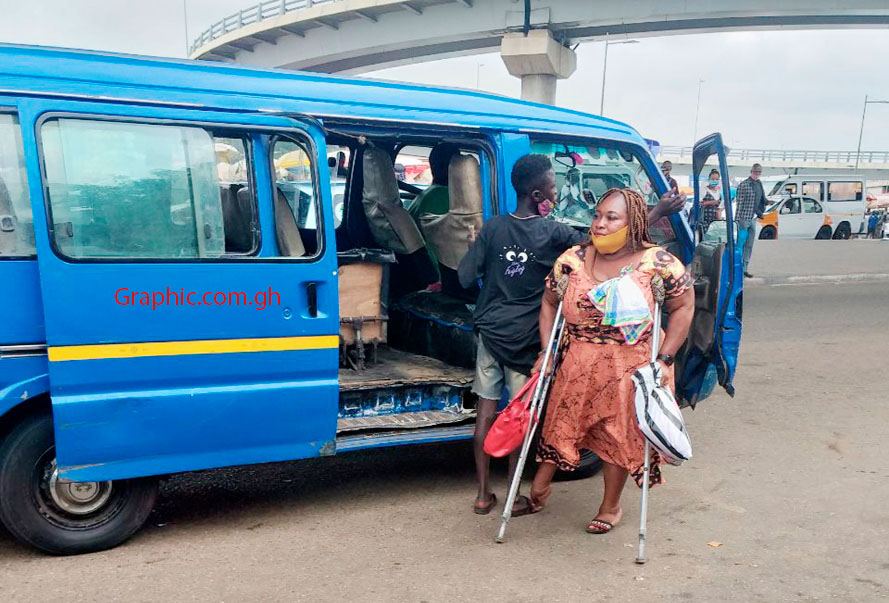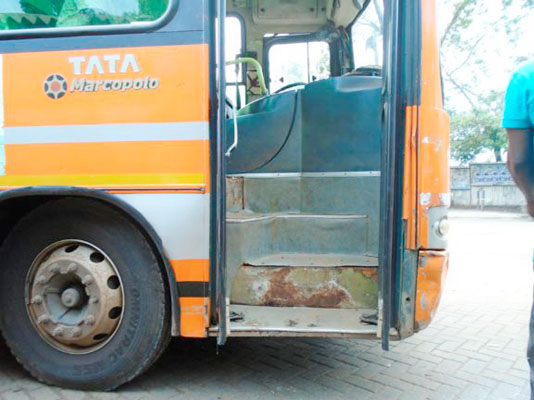
Access to transportation facilities: PWDs deserve better
“We go through a lot of painful moments in the hands of drivers and their mates when we try to board commercial vehicles. Sometimes, we are denied access to vehicles because the drivers think we are a burden on them.
“The design of the vehicles we have in the system are such that those of us who use clutches cannot board them. The spaces between the seats are also too small so sometimes even if you struggle to get on board a vehicle and your clutches interfere with some passengers, they can verbally abuse you.”
Advertisement
These words from Mr Anthony Darkwa, a physically challenged person, summed up the ordeal persons with disability (PWDs) go through to access transport facilities.
Mr Darkwa’s lamentation was about how disability-insensitive transport infrastructure had conspired with uncompromising drivers of commercial vehicles to deprive PWDs their dignity.
A 36-year-old PWD, Issah Ziyad, also narrated how he hires a taxi most of the time to get to his destination because some commercial drivers denied him the opportunity to board their vehicles because of his physical disability.
“Sometimes, I can be at a bus stop for close to an hour because no driver wants to take me because of my wheel chair. In most cases, I have to use my meagre resources to take a taxi home,” he said.
Disability Act
Section 29 of the PWD Act, 2006 (Act 715) states: “A person responsible for the booking of passengers on a commercial bus shall reserve at least two seats for the persons with disability except that where the bus is full without the reserved seats having been occupied, the driver or the person responsible for putting passengers on the bus may, fill the reserved seats with other passengers.
Section 23 of Act 715 states: “The Ministries responsible for rail, air and road transport and where appropriate the Ministry of Local Government shall ensure that the needs of PWDs are taken into account in the design, construction and operation of the transportation network.”
Non-compliance
Despite the provisions of At 715, PWDs continue to suffer all manner of discrimination and abuses in accessing transport facilities because the key stakeholders have failed to respect their rights.
A visit to both public and private transport facilities has revealed that very little or nothing at all has been done to give dignity to PWDs. Ticketing officials at bus stations, popularly called "book men," determine the kind of courtesy to accord PWDs who come to board commercial vehicles.
"When the nature of disability is such that the person crawls on the ground or the person is an amputee or a blind person, we give them priority," a bookman at the Kwame Nkrumah Interchange, Mr Abraham Kwofie, said.
When I contacted the Ghana Private Road Transport Union (GPRTU), it was evident that they lacked knowledge about the provisions of Act 715. The General Secretary of the union,
Mr Issah Khaleepha, said he did not know that any such law existed.
Meanwhile, the buses operated by state-owned Intercity STC Coaches are also not disability-friendly. Although the Metro Mass Transit (MMT) made provision for PWDs in their buses, the arrangement is often subject to abuse by other passengers.

Poorly designed vehicles
Contrary to the provisions of Section 23 of Act 715, the country’s transport infrastructure has been poorly designed and remains a herculean task for PWDs to use. Buses and trotros have inaccessible entrances that make it difficult for persons with mobility disability to enter the vehicles.
Some of the PWDs virtually crawl into those vehicles or have to be carried by other people in a very dehumanising manner into the vehicles. The situation is even worse for PWDs who move with wheelchairs as some drivers deny them access to vehicles with the excuse that they cannot guarantee their safety.
PWDs who are lucky to go on board “trotros” have to go through another painful ordeal of coping with small aisle spaces which are mostly crowded. The seating arrangement in these vehicles is such that PWDs have no comfort when they are on board.
Meanwhile, bus stops that serve as resting places for prospective passengers is inaccessible for persons with mobility disability, especially users of wheel chairs and clutches.
The scars
This development, according to a disability rights activist and lecturer at the Department of Social Works at the University of Ghana, Dr Augustina Naami, leaves PWDs with social, economic and psychological scars that never get healed.
In her research work titled “Access barriers encountered by persons with mobility disability in Accra-Ghana,” she highlighted how inaccessible physical structures hindered the daily life of PWDs.
The research concluded that PWDs who crawled on the bare floor to enter commercial vehicles were exposed to infectious diseases while many others got hurt as a result of being carried into cars.
Throwing more light on the research when I contacted her, Dr Naami explained that apart from the embarrassment the inaccessible transport infrastructure brought on PWDs, it also worsened their financial burden.
Enforcement
Section 30 of Act 715 states “A person who contravenes Sections 29 commits an offence and is liable on summary conviction to a fine not exceeding fifty penalty units or to a term of imprisonment not exceeding three months or to both.”
However, the Chairman of the board of the National Council on PWDs (NCPD), Mr Yaw Ofori-Debrah, said the law has become a toothless bulldog that never bites.
Mr Ofori-Debrah, who until recently was the National President of the Ghana Federation of Disability Organisations (GFD), said policy makers in the transport sector had relegated the inputs of PWDs to the background, hence the continuous flouting of the provisions of Act 715.
The continuous sidelining of PWDs, especially those with mobility challenges in terms of access to transport facilities is an infringement of their right to dignity and protection.
State institutions including the Ministries of Transport, Local Government and Rural Development, Gender, Children and Social Protection must collaborate and lead the way to make the transport system safe for PWDs.
There is also the need for conscious efforts to be made to educate transport operators, vehicle owners and drivers on the rights of PWDs under Act 715.
Writer’s E-mail: [email protected]




